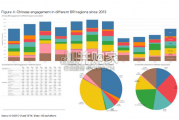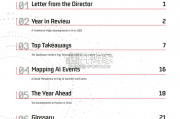China’s financing and investment spread across 61 BRI countries in 2023 (up...
2024-02-27 31 英文报告下载
Capabilities. Space-based capabilities impact many day-to-day aspects of the American way of life. These capabilities enable functions that affect our homes, transportation, electric power grids, banking systems, and our global communications. Satellites provide access to a broad range of information and enable many services in real time, from watching breaking news to monitoring our deployed armed forces around the world day or night. These and other benefits enabled by space systems are the result of more than 60 years of dedicated work by government agencies—military and civilian—supported by many commercial space providers. Space systems also enable the United States and our allies to project combat power to areas of conflict and instability and allow our armed forces to collect vital intelligence on foreign threats, to navigate and maneuver rapidly, and to communicate with each other anywhere around the globe to ensure our security and quick response to international military and humanitarian crises. Competition.
Space competition between the United States and the former Soviet Union began in earnest with Moscow’s launch of the world’s first artificial satellite, Sputnik-1, in 1957. China’s emergence as a space power in the late 20th and early 21st century and Russia’s post-Soviet resurgence have expanded the militarization of space as both countries integrate space and counterspace capabilities into their national and warfighting strategies to challenge the United States. Adversaries have observed more than 30 years of U.S. military operations supported by space systems and are now seeking ways to expand their own capabilities and deny the U.S. a space-enabled advantage.1 China and Russia, in particular, are developing various means to exploit the perceived U.S. reliance on space-based systems and challenge the U.S. position in the space domain.2 Beijing and Moscow seek to position themselves as leading space powers, intent on creating new global space norms. Through the use of space and counterspace capabilities, they aspire to undercut U.S. global leadership. Iran and North Korea will continue to develop and operate electronic warfare (EW) capabilities to deny or degrade space-based communications and navigation.

标签: 英文报告下载
相关文章

China’s financing and investment spread across 61 BRI countries in 2023 (up...
2024-02-27 31 英文报告下载

Though the risk of AI leading to catastrophe or human extinction had...
2024-02-26 51 英文报告下载

Focusing on the prospects for 2024, global growth is likely to come i...
2024-02-21 96 英文报告下载

Economic activity declined slightly on average, employment was roughly flat...
2024-02-07 67 英文报告下载

Economic growth can be defned as an increase in the quantity or quali...
2024-02-06 82 英文报告下载

In this initial quarterly survey, 41% of leaders reported their organizatio...
2024-02-05 66 英文报告下载
最新留言